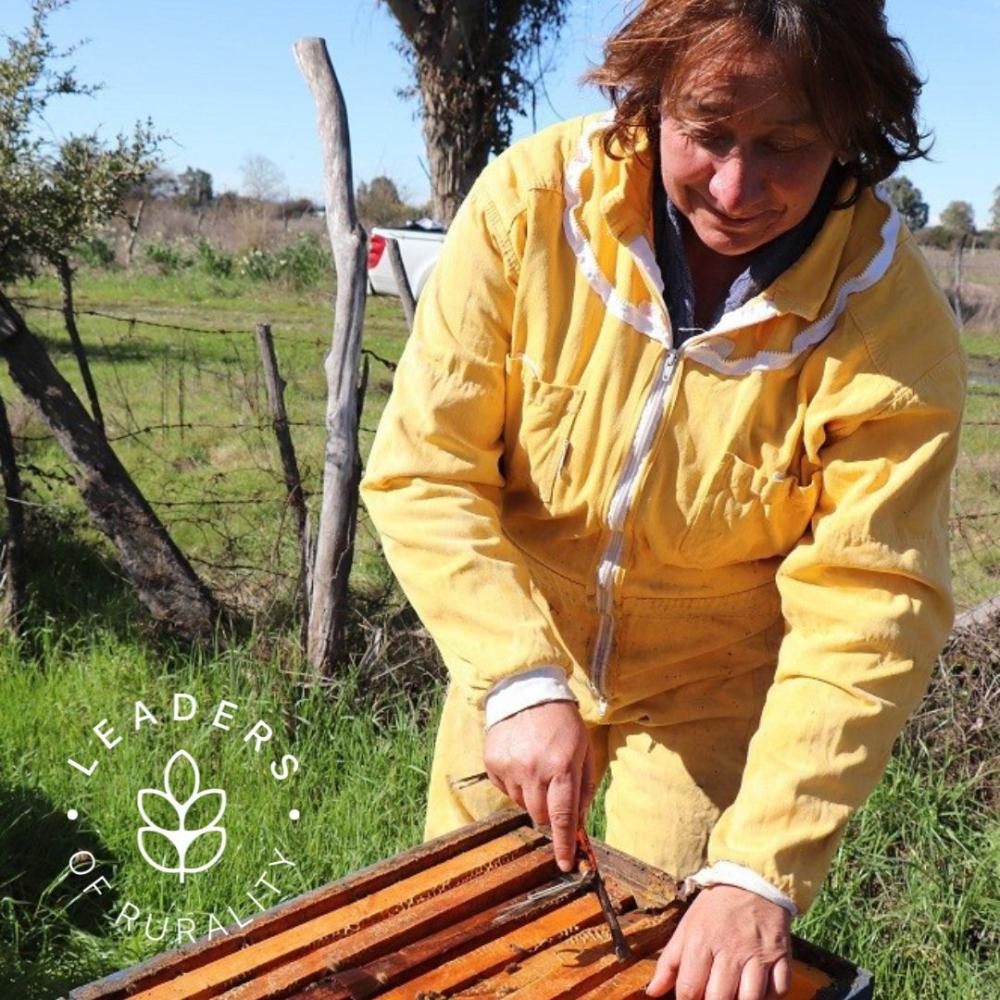The Leaders of Rurality award pays tribute to those who are playing a unique dual role: guaranteeing food and nutrition security, by producing under all circumstances, as well as protecting the biodiversity of the planet. It also emphasizes their capacity to be positive role models in rural areas of the region.

Santiago, 17 April 2023 (IICA) – Two women from rural Chile who work to produce food every day, while also making a significant contribution to well-being and rural retention in their communities, were recognized as “Leaders of Rurality” of the Americas by the Inter-American Institute for Cooperation on Agriculture (IICA).
Paulina Carrasco, a dairy farmer from the region of Los Ríos, and Bernarda Salazar, a beekeeper from Ñuble, received their awards directly from Esteban Valenzuela, Minister of Agriculture of Chile, and Manuel Otero, Director General of IICA, at a ceremony held in Santiago.
Both women received the “Soul of Rurality” award, as part of an initiative by IICA to pay tribute to men and women who are leaving their mark and making a difference in the rural areas of the Americas, which are key to the food and nutrition security and the planet’s environmental sustainability.
Salazar is an emblematic figure of family farming in Ñuble. This year she played a key role in supporting her peers, who were affected by the devastating forest fires that ravaged Chile in February and March. Some farmers lost everything to the fire.
For her part, Carrasco is the first woman to have led the Dairy Farmers Association of Los Ríos (APROVAL) in its more than 20-year history, and for many years has managed Agrícola Cocule, a family dairy located in La Unión.
The Leaders of Rurality award pays tribute to those who are playing a unique dual role: guaranteeing food and nutrition security, by producing under all circumstances, as well as protecting the biodiversity of the planet. It also emphasizes their capacity to be positive role models in rural areas of the region.
For the love of the land
Born and raised in La Unión, Paulina Carrasco moved to Santiago to study at the University of Chile, where she graduated as an agronomist specialized in livestock production. She later returned to her native land for a better quality of life, where her family, at the urging of her grandmother of Italian descent, had set up a dairy in 1955.

“I was born in La Unión but I always lived in the countryside. When I went to study in Santiago, all I thought of was returning south. I am the granddaughter and daughter of hardworking men and women with a great sense of community”, says Paulina.
Her father passed on to her his love for the land and agricultural production, and she eventually took over Agrícola Cocule, splitting her time between this and many other union-related activities.
She has been President of the Dairy Farmers Association of Los Ríos since 2020 and a member of “Women in Action”, a group consisting of 20 dairy farmers, under the coordination of the National Institute of Agricultural Research (INIA). The group seeks to employ innovation and new technologies to make production more sustainable. She also presides over a sports club and is director of her city’s cultural center.
“Our activity speaks to heritage and culture”, she says. “It is part of the society in which we live. We are not oblivious to what is happening in the cities or in our environment. That is why all union action must have a parallel social action with our direct members and their families, with sports, with art and culture in all its forms, and while training new generations to work in the field”.
A beekeeper defined by perseverance
Bernarda Salazar is a family farmer and beekeeper. In the commune of Bulnes, Ñuble, where she has 300 hives, she is known for her unwavering desire to learn, to improve her production and to tout the quality of Chilean honey in order to tap into new markets.
President of the beekeeping committee Comité Apícola Las Camelias and director of the Beekeeping Network, she was one of the many affected by the spate of fires across the country in early 2023, in the midst of a 13-year drought and an unusual heat wave.
Despite her personal loss, Salazar joined forces with her peers to help the farmers who were impacted the most. “We must work together; I am convinced that unity is strength”, she says.
Bernarda had traditionally worked in small-scale agriculture and began to produce honey in 2013, at first for personal consumption. She sought training and gradually grew the activity with tenacity and the support of the Agricultural Development Institute (INDAP).
Today Bernarda produces honey flavored with herbs and natural fruit like blueberry, turmeric, orange, maqui and lemon balm under the Alhelí brand, as well as hive product-based creams, balms and soaps, all as a result of her determination and conviction that mutual collaboration among small-scale farmers is the key to progress for everyone.

More information:
Institutional Communication Division.
comunicacion.institucional@iica.int











